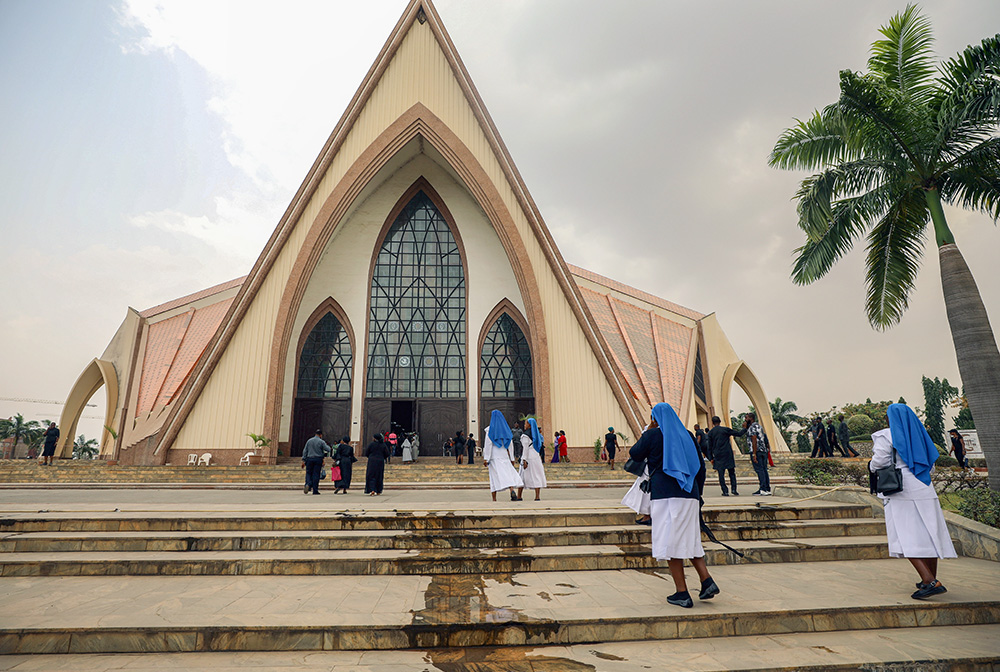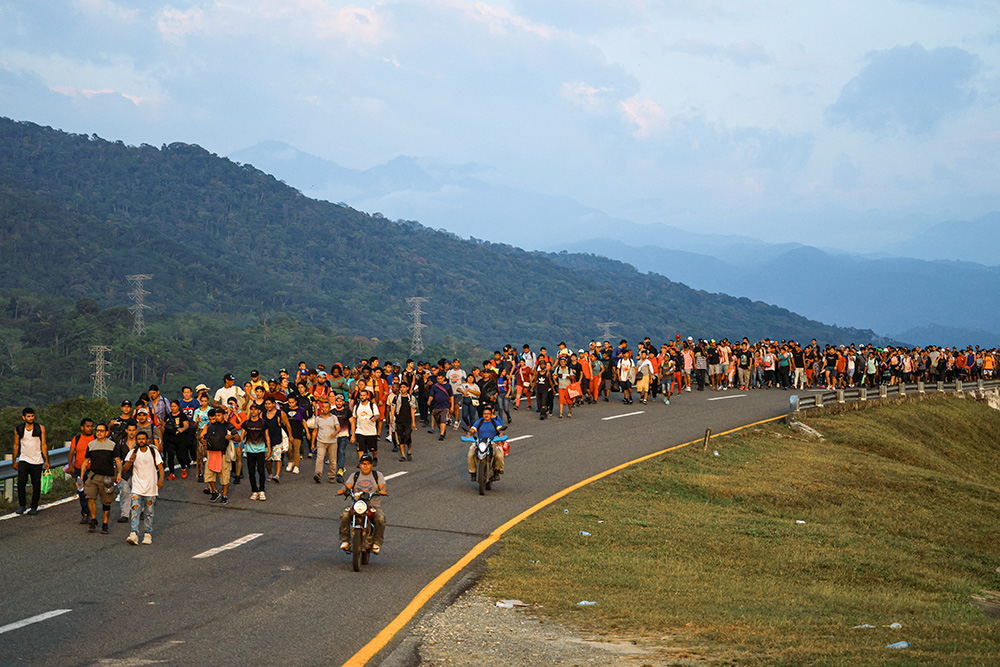
Women religious are pictured in a file photo entering a church in Abuja, Nigeria. (OSV News/Reuters/Afolabi Sotunde)
Crises affecting women in more than one dozen countries — including Afghanistan, Haiti, Israel, Palestine, Lebanon, Syria and Ukraine — are on the Georgetown Institute for Women, Peace and Security's list of conflicts to watch in 2025.
The annual listing sounds a somber note as the year begins, saying that the rights of women "are increasingly their own battlefield, with many countries imposing greater restrictions on women's hard-won freedoms and harassment of women rights defenders increasing."
The study adds: "Rates of conflict-related sexual violence have also skyrocketed to staggering levels as nearly one-third of countries are grappling with state-based hostilities — the highest number since tracking began in 1946. States and international organizations also determined genocide — often targeting women through rape and reproductive violence — amidst multiple conflicts."
The yearly summary, authored by analysts Jessica Anania and Dawn Le, are drawn from the institute's WPS Conflict Tracker, which monitors and analyzes global armed conflict through a lens of women, peace and security issues, the institute said.
This year, two countries — Chad and Nigeria — are being added to the list. In its brief summaries of conflicts in those countries, the institute said of Chad and neighboring countries in Africa's Sahel region: "Women and girls will be disproportionately impacted by compounding climate and conflict challenges in Chad and the broader region."
Of Nigeria, the study said: "Women leaders are key to crisis management and stability as the country faces extremist violence and the worst economic crisis in a generation."
Other summaries:
- In Afghanistan, the ruling Taliban's "complete erasure of women and girls from public life will lead to increasingly deadly outcomes," the study said.
- In Haiti, the study said, "Haitian women — whose leadership is crucial to long-term stability and democratic transition — face dire threats from sexual violence and targeted killings by gangs."
- The study said in Israel, Palestine and Lebanon women "remain marginalized from decision-making while facing a catastrophic humanitarian toll."
- In Syria, the study said that women "have new opportunities for greater political participation amidst the post-Assad transition despite risks of increased repression and violence."
- In Ukraine, the study said, "Resourcing women's organizations and elevating women peacebuilders will be key as the war enters a pivotal phase."
Sisters react to Trump's immigration plans, pardons
President Donald Trump wasted no time making controversial moves after being sworn into office on Jan. 20, and Catholic sisters and sister-led groups were just as quick to condemn many of them.
The biggest reaction was to the crackdown on illegal immigration and plans to ignore long-held policies of avoiding arrests in places such as churches, schools and hospitals.

Migrants walk in a caravan bound for the northern border with the United States, in Huixtla, Mexico, Jan. 13, 2025. (OSV News/Reuters/Damian Sanchez)
The Catholic Legal Immigration Network (CLINIC) on Jan. 21 strongly condemned the executive orders issued by Trump on his first day in office that seek to eliminate birthright citizenship, diminish the U.S. refugee and asylum programs, separate families, and further militarize the U.S.-Mexico border. CLINIC called the moves "a direct affront to the long-standing values of our nation" that "run contrary to the fundamental Christian principle of welcoming the stranger."
The next day, CLINIC responded to new plans to both end the protected areas policy and the resumption of the "remain in Mexico" policy, which requires asylum seekers to remain outside the country until their immigration case is heard.
"These policy changes are an affront to human dignity and compassion," Anna Gallagher, CLINIC executive director, said in a statement. "They send a chilling message to our immigrant communities and create an environment of fear that will prevent people from seeking the support they need and accessing their rights. We will not stand idly by as the rights of immigrants are trampled."
CLINIC said it remains steadfast in its commitment to advocating for just and humane immigration policies that reflect Catholic values and the nation's historical commitment to welcoming newcomers. CLINIC said it stands ready to support its more than 400 affiliates across the country, providing ongoing guidance and resources to help them address the challenges posed by the executive orders.
The Catholic Health Association, Catholic Charities and the U.S. Conference of Catholic Bishops joined the condemnation of revoking the protected areas policy. The three organizations issued a joint statement saying the church's charitable services are not dependent on citizenship or immigration status, but are part of its nature, "an indispensable expression of her very being."
Violating protected areas will keep people from the services they need, the joint statement said.
Advertisement
"We recognize the need for just immigration enforcement and affirm the government's obligation to carry it out in a targeted, proportional, and humane way. However, non-emergency immigration enforcement in schools, places of worship, social service agencies, healthcare facilities, or other sensitive settings where people receive essential services would be contrary to the common good," the statement said. "Turning places of care, healing, and solace into places of fear and uncertainty for those in need, while endangering the trust between pastors, providers, educators and the people they serve, will not make our communities safer."
Susan Gunn, director of the Maryknoll Office for Global Concerns, said Maryknoll will continue to uphold the dignity of each human being.
"To those who are feeling scared and vulnerable in this difficult moment, know that we stand with you. No matter the country you come from, your faith tradition, or your immigration status in the United States: in Maryknoll missioners, you have friends and advocates. To those who are confused about how to respond to the changes brought by the executive orders, I encourage you to take action in your community to be a source of light and hope for those who are afraid and vulnerable," Gunn said in a statement. "Together we can bring light to dark places, alleviate suffering, and build peace by caring for the least among us and opening our embrace to our global human family."
The Adrian Dominicans focused on Trump's pardon of more than 1,500 people involved in the Jan. 6, 2021, assault on the U.S. Capitol, the vast majority of whom had already been convicted or pleaded guilty.
The congregation's statement called the pardons "unprincipled and dangerous."
"It is a blanket affirmation of the criminal behavior of individuals who attempted to overturn the results of the 2020 presidential election, assailing our democracy and injuring more than 140 police officers who valiantly put their lives on the line in defense of our Capitol and the members inside," the Jan. 24, 2025, statement said. "As women of faith, we deeply believe in the virtue of mercy — particularly in giving mercy to those who repent and ask for forgiveness."
These pardons, however, were unjust, the community said.
"This was clearly not an act of mercy. It was an act of contempt," the statement said. "It was an act of contempt for the U.S. Congress, the Constitution, the rule of law and all those who enforce it. It was an act that gives license to those freed from serving their court-ordered sentences, as well as others, to engage at will in acts of violent political opposition that endanger public servants and democratic institutions. ... The pardons are not merciful; they are alarming."






